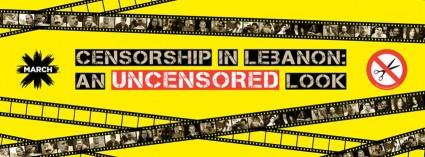
The article below was my contribution to MARCH‘s monthly newsletter that was distributed all across Lebanon few weeks back. MARCH has been pulling an amazing job in raising awareness on the importance of freedom of expression as a catalyst for tolerance and acceptance of the other and in fighting all sorts of cultural terrorism.
I strongly believe we should be given the right to choose what to watch, read and listen to and I am offended by the fact that some people get to choose for us.
Here’s the article:
When The Jyllands-Posten Muhammad cartoons were published back in 2005, angry and violent protests were sparked around the world, and several western Embassies were attacked and damaged. Even though the cartoons were meant to “contribute to the debate about criticism of Islam and self-censorship”, The Muslim World took offense in them and reacted aggressively. One of the Danish Islamists who helped fuel the uproar over the caricatures and led the demonstrations against the drawings in Denmark is a Lebanese-born called Ahmad Akkari. He was so infuriated by these cartoons that he took the hassle of traveling to several countries and fuel Muslim crowds against the Danish government.
The reason I mentioned this story is because the same Ahmad Akkari who organized demonstrations that resulted in the death of over 200 people, and had a big part in turning the issue into an international crisis, has come out a month ago to declare that he regrets taking part in these protests and apologized to the Danish Cartoonist Kurt Westergaard and to the entire nation of Denmark. He even went as far as saying that he didn’t mind publishing the cartoons anymore, which were reposted in the papers throughout Europe almost every year after 2005, knowing that he’s still a practicing Muslim.
Now some may argue that the Danish cartoons were indeed offensive to Islam and the Prophet (I personally thought they were), and should not have been published, but as long as they didn’t violate any laws in Denmark, nothing justifies the violent reactions that we witnessed back then. In fact, the outcome of those riots was more harmful to Islam than the cartoons themselves.
Going back to Lebanon, The General Security Censorship Bureau decided last month to ban a play about censorship written/directed by Lucien Bourjeily and produced by MARCH from public performance. Moreover, the head of the censorship bureau was highly offended by this play and based on what MARCH reported, “was shouting and saying the play was not unacceptable as we were making fun of the censorship bureau, and, according to him portraying a wrong image of them and that he will not allow it.”
Even though the first topic mentioned was of religious nature while the other was a play directed towards a governmental bureau, the common point is that both were artistic works aimed at promoting freedom of speech and self-censorship, and in both cases the reaction was impulsive and violent causing more harm than the work presented.
Having said that, I ask the head of the Censorship bureau to look at the bigger image, follow the Ahmad Akkari example, by reevaluating the bureau’s censorship standards and understanding the sacred values of our society and the importance of freedom of speech and accepting criticism. In fact, if there’s anything that history has taught us, is that the censorship of works of art never prevails and harms the censoring party rather than the artist himself.
That being said, let the Lebanese decide what is rubbish or not, what to watch or not, and don’t deprive them of their most basic right, the freedom of choice. Let the bureau be an example to follow by other institutions and its head a role model for the upcoming generations. Let the Lucien Bourjeily play pass and be the first one to attend it.
The greatest statesmen in history were the ones who accepted criticism and took it well. Winston Churchill himself stated that “Criticism may not be agreeable, but it is necessary. It fulfills the same function as pain in the human body. It calls attention to an unhealthy state of things.”